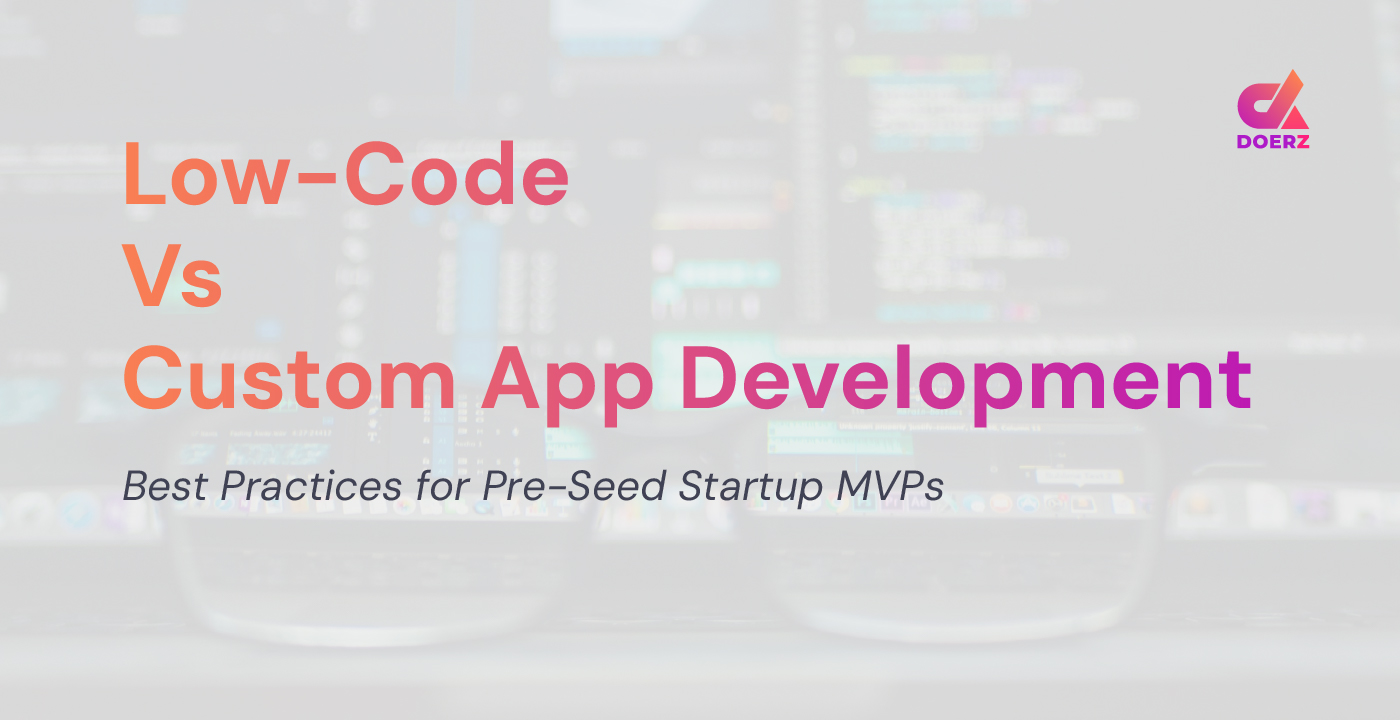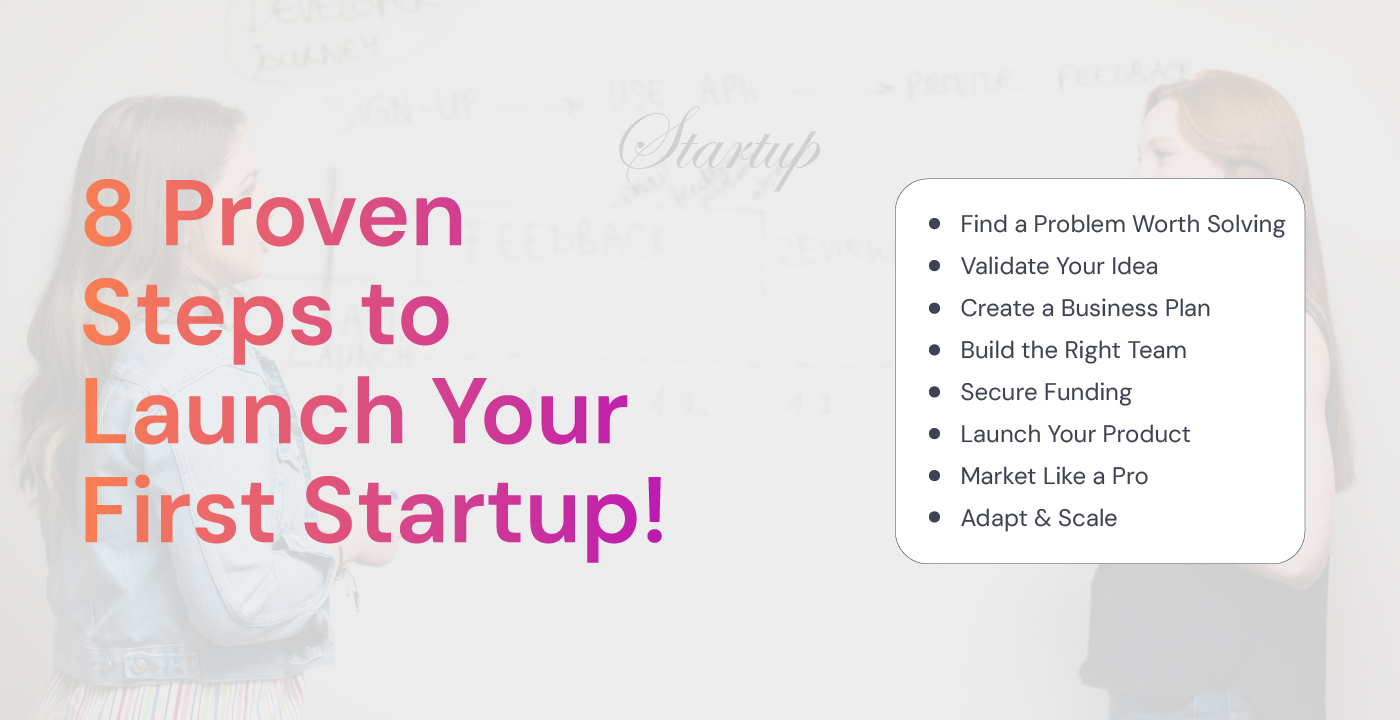Low-Code vs Custom App Development: What’s Best for Pre-Seed Startups Building an MVP?
Every pre-seed startup faces a big question before launching its first MVP:
Low-code vs custom app development for the pre-seed startup app? Which one to pick?
This choice can change everything: how quickly you launch, how much you spend and how strong your foundation is.
Right now, you are running on limited time, limited cash and a lot of hope. You need to show progress fast but cutting the wrong corners early can slow you down later.
So, how do you find the balance?
You should know which option fits your MVP development strategy. Let us tell you the best practices for pre-seed startups building an MVP.
At Doerz Tech, we usually recommend a balanced approach.
Build most of your MVP around 70%, with low-code tools, so you can launch fast. Then, once your idea is proven, start moving the key parts to custom code at your own pace.
Low-Code vs Custom App Development: What’s the Difference?
Low-code platforms like Bubble, Adalo, and OutSystems let you build apps visually by using drag-and-drop tools instead of heavy coding.
Custom app development is traditional software engineering. You write code from the ground up by using frameworks like React, Node.js, or Python.
For a pre-seed startup app, your choice is based on your short-term goal. Are you trying to test an idea fast, or are you building something that needs to last and scale?
- Low-code is faster, affordable and great for prototypes.
- Custom app development is flexible, scalable, and 100% on your vision.
Why Do Pre-Seed Startups Lean Toward Low-Code?
In the early days, time and cash were your biggest constraints. That’s why so many founders now prefer low code for startup app projects. It is simply faster to ship.
In fact, around 34% of startups fail simply because they never find product-market fit, repeating the same mistakes that caused other startups to fail. That’s why validating your idea fast before the money runs out matters more than building something “perfect.”
Airtable began as a low-code tool itself and gave founders an easy way to create data-driven solutions without building everything from scratch.
For a pre-seed startup app, low-code helps you:
- Get your concept in front of users within weeks, not months.
- Save thousands in early engineering costs.
- Focus on validation and feedback, not debugging.
The Case for Custom App Development
Of course, low-code is not forever.
If your MVP development has complex workflows, integrations, or heavy backend logic, you will eventually hit the limits of low-code platforms.
Companies like Shopify and Slack started with custom architectures early on because their products needed unique systems. Something that pre-built tools couldn’t support.
Many founders today use a hybrid approach:
Start with low-code, validate, then rebuild using custom code once traction is proven.
If you are planning long-term, or your product requires performance and scale from day one, custom is the way forward.
Custom app development brings all of this to the table:
- Complete control over architecture, logic and security.
- Unlimited flexibility for APIs, third-party tools or custom features.
- A foundation that grows with your business.
Speed vs Scalability: Finding the Sweet Spot
This is where most early founders struggle. Speed versus scalability.
If your idea is still untested, using low-code for startup app development helps you move fast, test your concept, and make changes without burning through your budget.
But once people start signing up, giving feedback, and your idea begins to take off, you will need the flexibility and control that only custom code can offer.
That’s exactly what companies like Notion and Canva did. They didn’t start out huge. They started with something simple that solved one clear problem and refined it as more users came in.
Cost Comparison: Which One Saves You More?
Let’s talk numbers because at the pre-seed stage, every dollar counts.
Building only what’s essential to prove traction and attract investors is one of the most practical first steps when starting your startup journey. Then, you can decide later whether your product deserves a full rebuild.
- A low-code MVP development can cost between $5,000 and $10,000, but it definitely depends on features and design.
- A custom app built from scratch can easily go past $25,000 to $50,000 if you hire a development agency or full-time team.
Flexibility and Ownership: The Hidden Factors
This is something many founders don’t think about until it’s too late. Ownership. And it is one of the best practices for pre-seed startups building an MVP.
When you build with a low-code platform, your backend, hosting, and sometimes your data live on that platform. It is convenient, but you are partly dependent on their ecosystem.
Custom development gives you full ownership of your data, your codebase and your product’s future direction.
If your app operates in a regulated industry (like fintech or healthcare), or requires strict data control, you will probably need to switch from low-code sooner than later.
It’s all about knowing when the convenience of low-code becomes a constraint.
Real-World Strategy: Mix Both for Smart Growth
Founders who win don’t stick to one side. They use what works.
Low-code helps you get your MVP out fast and see if people actually want what you’re building.
Once the idea proves itself and you start gaining traction, that’s when you move the core parts to custom code for more control and long-term growth.
This hybrid model is one of the most reliable best practices for pre-seed startups building an MVP.
At Doerz Tech, we have seen it work repeatedly.
Smart founders move fast, test with real users and then rebuild once they know the idea works, often with investor support behind them.
The Verdict on Low-Code Vs Custom App Development
At the end of the day, the best approach depends on where you are, not where you want to be five years from now. This is a mindset where you should never skip the fundamental steps that lead to startup success.
Settling the low-code Vs custom app development for a pre seed startup app debate once and for all:
- If your goal is speed, affordability and validation, go low-code.
- If your goal is scalability, control and performance, go custom.
- If you want both, start with low-code and transition smartly.
Team Doerz Tech helps pre-seed founders move from idea to launch by mixing low-code tools with custom engineering strategies that fit your timeline and budget.
Have an idea worth building?
Book a 30-minute FREE consultation and we will map out your MVP development.









